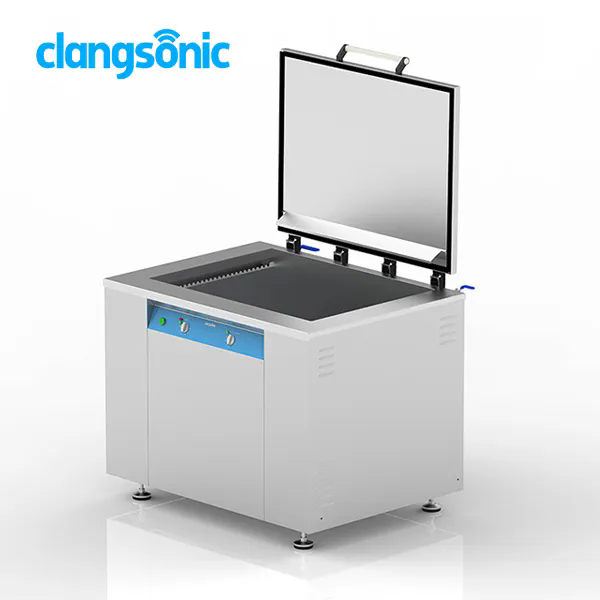Detailed Overview of 40khz Ultrasonic Cleaner
2024-07-30
A 40kHz ultrasonic cleaner is a device that uses ultrasonic waves to clean objects by agitating a cleaning solution. It operates at a frequency of 40 kilohertz (kHz), which is effective for cleaning a wide range of items, particularly those with intricate details or delicate components. Here’s an overview of 40kHz ultrasonic cleaners, including their features, benefits, and applications:
Key Features
1. Frequency:
- 40kHz: The frequency of 40kHz is a common setting for ultrasonic cleaners. It provides a balance between cleaning power and the ability to clean delicate items without causing damage.
2. Transducers:
- Ultrasonic Transducers: Convert electrical energy into high-frequency sound waves, which are then transmitted through the cleaning solution.
3. Tank:
- Material and Size: Typically made from stainless steel for durability and corrosion resistance. Available in various sizes to accommodate different types and quantities of items.
4. Heating Element (optional):
- Heater: Some models include a built-in heating element to warm the cleaning solution, which can enhance cleaning efficiency and remove stubborn contaminants.
5. Timer and Temperature Control:
- Adjustable Timer: Allows users to set the cleaning duration based on the specific needs of the items being cleaned.
- Temperature Control: Enables users to regulate the temperature of the cleaning solution for optimal cleaning performance.
6. Cleaning Solution:
- Solution Compatibility: Uses a specialized cleaning solution or detergent designed to work with ultrasonic waves for effective cleaning.
7. Digital or Analog Controls:
- User Interface: Digital models often feature LED displays and programmable settings, while analog models may have manual knobs and dials.
8. Basket and Accessories:
- Basket: Usually comes with a removable basket or tray to hold items during cleaning, preventing them from coming into direct contact with the ultrasonic transducers.
Benefits
1. Effective Cleaning:
- Deep Cleaning: Ultrasonic waves create cavitation bubbles that scrub surfaces and remove contaminants even from intricate or hard-to-reach areas.
- Uniform Cleaning: Ensures a consistent and thorough clean across all surfaces of the items.
2. Gentle on Delicate Items:
- Non-Abrasive: Cleans without physical abrasion, making it suitable for delicate or sensitive items that might be damaged by traditional cleaning methods.
3. Time Efficiency:
- Fast Cleaning: Provides rapid cleaning compared to manual methods, reducing overall cleaning time.
4. Versatility:
- Wide Range of Items: Effective for cleaning a variety of items, including jewelry, dental instruments, electronics, and small mechanical parts.
5. Improved Safety:
- Reduced Manual Handling: Minimizes the need for manual scrubbing and handling, which can be beneficial for both safety and reducing wear and tear on items.
6. Enhanced Results:
- Consistent Quality: Produces high-quality cleaning results with minimal effort, improving overall cleanliness and hygiene.
Applications
1. Jewelry Cleaning:
- Restoration: Removes dirt, oils, and residues from jewelry without causing damage to precious metals or gemstones.
2. Dental Instruments:
- Hygiene: Cleans dental tools and equipment thoroughly to ensure hygiene and sterilization before use.
3. Electronics:
- Component Cleaning: Cleans delicate electronic components and circuit boards without causing damage.
4. Automotive Parts:
- Precision Cleaning: Cleans small mechanical parts, carburetors, and other components with intricate designs.
5. Medical Instruments:
- Sterilization: Cleans medical tools and surgical instruments effectively to ensure they are free from contaminants.
Considerations
1. Size and Capacity:
- Tank Size: Choose a tank size that fits the items you need to clean. Larger tanks accommodate more or larger items, while smaller tanks are suitable for smaller batches.
2. Cleaning Solution:
- Appropriate Solution: Use the right type of cleaning solution for the items being cleaned to enhance the effectiveness of the ultrasonic cleaning process.
3. Maintenance:
- Regular Cleaning: Clean the tank and replace the cleaning solution regularly to maintain optimal performance and avoid contamination buildup.
4. Safety:
- Proper Use: Follow the manufacturer’s instructions and safety guidelines to ensure safe and effective operation of the ultrasonic cleaner.
5. Frequency Selection:
- Frequency Needs: While 40kHz is effective for many applications, some items may require different frequencies (e.g., 20kHz for more aggressive cleaning or higher frequencies for very delicate items).
A 40kHz ultrasonic cleaner provides effective and efficient cleaning for a wide range of items, offering benefits in terms of cleanliness, speed, and versatility. Proper use and maintenance will help maximize its performance and longevity.



